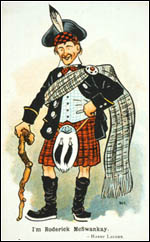 Sir Harry Lauder was one of Scotland's best loved entertainers whose career spanned the first half of the twentieth century. A staunch nationalist, Lauder's personal leadership and example during World War One earned him a knighthood in 1919.
Sir Harry Lauder was one of Scotland's best loved entertainers whose career spanned the first half of the twentieth century. A staunch nationalist, Lauder's personal leadership and example during World War One earned him a knighthood in 1919.
Sir Harry Lauder was born on August 4, 1870 in Portabello, near Edinburgh. He was the oldest of eight children born to John Lauder and Isabella Urquhart MacLeod MacLennan. When Harry's father died of pneumonia in 1882, the entire family moved to Arbroath. There, at the ripe old age of twelve, Harry went to work to help support his brothers and sisters.
But Harry loved to sing, first in Gordon's flax-spinning mill where he earned two shillings a week, then later, in the Lankshire coal mines, where his musical talents got him noticed. 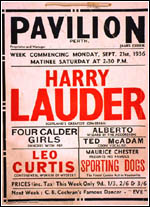 It wasn't too long before Harry was entering competitions, winning prizes and then getting paid to sing.
It wasn't too long before Harry was entering competitions, winning prizes and then getting paid to sing.
Harry had his first real experience in the theatre when he joined touring companies called "concert parties." For thirty-five shillings a week, he travelled around Ayrshire, Dumfrieshire, the Borders and Central Scotland performing comedy. Finally, in 1894, at the age of 24 years, Harry had his first professional engagement at Larkhall. His fee was 5 shillings.
Over the next four years, Harry formed a touring company called the Lauder-Murdoch Concert Party with the violinist MacKenzie Murdoch. The company had its ups and downs and even lost one hundred pounds its first year of business. But they rebounded and in general, the company was successful.
Lauder's first big break occured on June 1, 1898 when he appeared at the Argyle Theatre in Birkenhead. 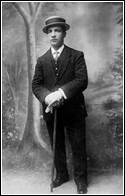 There his talent shone through and it was just a matter of time before Lauder was making 200 pounds a week.
There his talent shone through and it was just a matter of time before Lauder was making 200 pounds a week.
One success led to another and by 1907, Harry was touring overseas in the United States where he became a huge success. He also went to Canada, Australia, New Zealand, South Africa, and Asia.
Lauder's critics railed against his portrayal of Scots as tightfisted penny-pinchers. And no wonder! He took great pains to portray himself as the quintessential cheapskate, even going so far as to make up stories of his own meanness to get a laugh. But, as anybody who knew him would say, it was all just for show. Lauder's generosity for the less fortunate, be they human or animal, was well known among the people who mattered.
Nevertheless, his critics still accused him of negatively stereotyping the Scottish nationality. Their criticism did not affect his popularity, as even today, the mention of Lauder's name draws a smile to the face of his many admirers.
According to the Scottish Theatre Archives, which maintains a collection of Sir Harry memorabilia and photographs, Sir Harry was a versatile comic who should be remembered for far more than being Scottish:
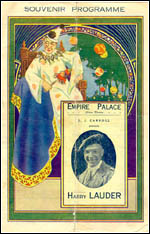
Although Lauder is best remembered as the little tartan comic with the twisted walking stick, in reality he was much more versatile and had many different character roles, including women. He soon, however, became known as a Scottish comedian. His sticks became his trade mark. One of his twisted sticks was brought from Japan by Edward Prince of Wales and presented to him. One of his character parts which held the audience spell bound was the youngster examining the toys pulled from his pocket in the sketch The saftest o' the family."
Scottish Theatre Archives
During World War One Harry's youngest son, John, was killed. In his sorrow over the death of his beloved son, Harry threw himself into helping the war effort. Although he was deemed too old to join the younger men in the trenches, he overcame opposition and was allowed to entertain the troops at the front. He also personally led a recruitment campaign and was responsible for signing up more than 12,000 soldiers.
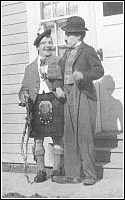 Harry even went to the United States where he gave public speaking engagements on the necessity of the US joining the War Effort. He also established the Harry Lauder Million Pound Fund for injured men, Scottish soldiers and sailors. One of the plans for the fund was to make a film co-starring Charlie Chaplin. Unfortunately, the film was never completed.
Harry even went to the United States where he gave public speaking engagements on the necessity of the US joining the War Effort. He also established the Harry Lauder Million Pound Fund for injured men, Scottish soldiers and sailors. One of the plans for the fund was to make a film co-starring Charlie Chaplin. Unfortunately, the film was never completed.
Harry Lauder continued to entertain until he retired in the 1930s. He came out of retirement to entertain the troops during World War Two, and his last public appearance was in 1947.
Sir Harry Lauder died in 1950, but his memory lives on in his music and in the hearts of his many fans.
by MJ, January 2000
Images by permission of the Scottish Theatre Archive, Special
Collections, Glasgow University Library





